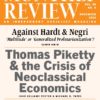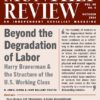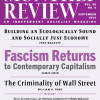Paul Burkett’s Marx and Nature Fifteen Years After
Every book more than a few years old needs to be seen within the historical context in which it was written—works of social science most of all. Re-reading Paul Burkett’s Marx and Nature today, nearly a decade and a half after its first publication, reminds me of how different in some respects the historical context was then, at the end of the twentieth century, from what we face today, in the second decade of the twenty-first century.… A decade and a half ago the contribution of Marx and Marxism to the understanding of ecology was seen in almost entirely negative terms, even by many self-styled ecosocialists. Today Marx’s understanding of the ecological problem is being studied in universities worldwide and is inspiring ecological actions around the globe.… These changes are of course connected. As the environmental problems engendered by capitalist society have worsened, the necessary movements of ecological defense have radicalized and spread across the face of the planet. | more…

November 2014 (Volume 66, Number 6)
On September 20, 2014, while corporate and government officials arrived in New York City for the UN Climate Summit, organizers and activists from around the world participated in a peoples’ summit called the NYC Climate Convergence (organized by the Global Climate Convergence and System Change Not Climate Change). The NYC Climate Convergence featured as the lead keynote speaker Naomi Klein, who presented the analysis of her new book, This Changes Everything: Capitalism vs. the Climate (Simon and Schuster, 2014). Her concluding chapter, significantly, is entitled “Leap Years: Just Enough Time for the Impossible.” Monthly Review readers will be interested that Klein observes in her book: “Karl Marx… recognized capitalism’s ‘irreparable rift’ with the ‘natural laws of life itself’”. Later she refers to “global capitalism’s voracious metabolism”. | more…
Piketty and the Crisis of Neoclassical Economics
Not since the Great Depression of the 1930s has it been so apparent that the core capitalist economies are experiencing secular stagnation, characterized by slow growth, rising unemployment and underemployment, and idle productive capacity. Consequently, mainstream economics is finally beginning to recognize the economic stagnation tendency that has long been a focus in these pages, although it has yet to develop a coherent analysis of the phenomenon. Accompanying the long-term decline in the growth trend has been an extraordinary increase in economic inequality, which one of us labeled “The Great Inequality,” and which has recently been dramatized by the publication of French economist Thomas Piketty’s Capital in the Twenty-First Century. Taken together, these two realities of deepening stagnation and growing inequality have created a severe crisis for orthodox (or neoclassical) economics. | more…
Contra Hardt and Negri
The term multitude was first used in Europe, it seems, by the Dutch philosopher Spinoza, to whom Michael Hardt and Antonio Negri explicitly refer. It then designated the “common people” who were a majority in the cities of the Ancien Régime and deprived of participation in political power (reserved for the monarch and the aristocracy), economic power (reserved for property owners of feudal ancestry or for the nascent financial bourgeoisie, both urban and rural—including the rich peasants), and social power (reserved for the Church and its clerics). The status of the common people varied. In the city, they were artisans, small merchants, pieceworkers, paupers, and beggars; in the country, they were landless. The common people in the cities were restless and frequently exploded into violent insurrections. They were often mobilized by others—particularly the nascent bourgeoisie, the active component of the Third Estate in France—in their conflicts with the aristocracy. | more…
The Ecological Civilization Debate in China
China is facing many serious environmental issues, including pollution in the air, groundwater, and soil. These problems have increased since China surpassed Japan as the world’s second-largest economy—and in spite of the Chinese government’s 2007 proposal to build an “ecological civilization,” and writing “ecological civilization” into the Chinese Communist Party’s (CCP) constitution in 2012. Take air pollution as an example; not long ago, cities such as Beijing, Tianjin, and Shanghai witnessed record-breaking smog. Concentrations of fine particulate matter (PM 2.5) reached more than forty times recommended safety levels. In China, up to half a million die each year because of air pollution, according to Chen Zhu, the former health minister of China.… What caused these serious environmental problems? A prevailing explanation is that China “lacks the rule of law”—especially environmental law.… Besides the legal issue, there are three factors responsible for China’s severe ecological crisis: (1) seriously underestimating the power of interest groups and the harmful consequence of capital; (2) the worship of growth or development; (3) an anthropocentric worldview. | more…
Welcome to post feminism and the left is obsolete
Marge Piercy is the author of eighteen poetry books, most recently The Hunger Moon: New & Selected Poems, 1980–2010 (Knopf, 2011). Her most recent novel is Sex Wars (Harper Perennial, 2005) and she has just published her first collection of short stories, The Cost of Lunch, Etc. (PM Press, 2014). | more…

October 2014 (Volume 66, Number 5)
Secular stagnation (or the trend towards long-term slow growth and continuing high unemployment/underemployment) has become a big issue in the mature economies since 2013, when former U.S. Treasury Secretary Larry Summers raised the question at an IMF economic forum. Compilations of work on the subject can now be found on the Internet, such as the one by economists Coen Teulings and Richard Baldwin; which however leaves out all contributions by heterodox economists. Teulings and Baldwin credit Summers with having “resurrected” the secular stagnation issue. But is this true? Only in the sense that he reintroduced it to mainstream neoclassical economics. It has long been a topic on the left, and particularly in Monthly Review, where editor Paul Sweezy explicitly drew attention to the “secular stagnation” question more than forty years ago—with MR tracking the stagnation trend month by month in the four decades that followed.… Isn’t it about time…that orthodox economists, Summers included, began to acknowledge the enormous work done on this topic on the left over decades, and indeed the greater complexity and historicity of the analysis to be found there—not only in MR but within heterodox economics more generally? Such an admission might even do orthodox economists some good. | more…
Beyond the Degradation of Labor
Harry Braverman’s Labor and Monopoly Capital, first published forty years ago in 1974, was unquestionably the work that, in the words of historian Bryan Palmer, “literally christened the emerging field of labor process studies.” In the four decades since its appearance Braverman’s book has continued to play a central role in debates on workers’ struggles within industry, remaining indispensable to all attempts at in-depth critique in this area.… This continuing relevance of Braverman’s analysis has to do with the fact that his overall vision of the transformations taking place in modern work relations was much wider than has usually been recognized. Viewed from a wide camera angle, his work sought to capture the complex relation between the labor process on the one hand, and the changing structure and composition of the working class and its reserve armies on the other. This broad view allowed him to perceive how the changes in the labor process were integrally connected to the emergence of whole new spheres of production, the decomposition and recomposition of the working class in various sectors, and the development of new structural contradictions. | more…
The Emergence of Marx’s Critique of Modern Agriculture
While he was preparing for his critique of political economy, Marx produced an enormous quantity of excerpt notebooks. Sometimes accompanied by his own comments, they largely consist of direct quotes from various books, journals, and newspaper articles that attracted his attention. Although they were neglected among Marxist scholars for quite a long time without publication in any languages, these notebooks, in addition to the manuscripts and letters, constitute an invaluable original source for understanding Marx’s thinking process.… Marx’s notebooks record his ceaseless efforts to grasp the totality of capitalism, and, since Capital remains unfinished, they provide useful hints for speculating how Marx would have completed his project of critique of political economy.… As an attempt to comprehend the development of Marx’s theory through his notebooks, this paper analyzes his excerpts from books by two agricultural chemists, Justus von Liebig and James F.W. Johnston, in order to reveal a significant modification in regard to Marx’s attitude towards modern agricultural practice, which led his to study the natural sciences even more intensively in his late years. | more…
Vietnam War Era Journeys
The cover of Judy Tzu-Chun Wu’s Radicals on the Road features a sepia-toned photograph of Eldridge Cleaver raising his fist in a Black Power salute behind three Vietnamese women in combat helmets, one of whom is kneeling behind an anti-aircraft gun. While you have probably seen a similar photograph of Jane Fonda from her North Vietnam trip in 1972, images like that of Cleaver are less common, if circulated at all. In this second book by Wu, she documents three sets of journeys, like Cleaver’s, that have remained at the margins of both the scholarship and the popular memory of the antiwar movement. | more…
E.P. Thompson: A Giant Remembered
It is surely difficult for young people today to grasp that thirty years or so ago, radical historian-activist Edward Thompson was by opinion polls intermittently the second or third most popular person in England, just after the Queen Mother. This was despite the British establishment, to say nothing of U.S. Cold Warriors (liberal or conservative), slandering him for decades—and why not? He had led massive protest movements of ordinary people against their government. Worse, in cloistered academic quarters he was viewed as having reorganized the whole idea of social history and turned it over to ordinary people! More than anyone else in the English-speaking world, he made the history of such people important. | more…
A Defining Moment: The Historical Legacy of the 1953 Iran Coup
The Cold War between the Soviet Union and the United States began in earnest as soon as the Second World War ended, shaping most of the remainder of the twentieth century. The U.S. doctrine of “containment” required confronting the Soviets at every point of contact, accompanied by the claim that lasting peace could be reached only through the establishment of an international order based on national states which enjoyed a U.S.-defined political liberty and a capitalist economic order. The Soviets bolstered their security through providing support to countries seen as friendly and close to their borders. Therefore, maintaining influence in Iran was a goal of Soviet foreign policy in the Middle East. U.S. foreign policy was shaped by its own state interests and ideology and driven by the American postwar, worldwide systems of military bases.… It is this turbulent period of geopolitical maneuvering that Ervand Abrahamian’s The Coup revisits. Yet, unlike other books on the 1953 events in Iran, Abrahamian locates the U.S.-backed coup less in the Cold War ideological confrontation between East and West than in the conflicts which opposed imperialism and nationalism; between the center of world capitalism and the underdeveloped economies heavily dependent on exporting raw natural resources. | more…

September 2014 (Volume 66, Number 4)
This year is the 150th anniversary of the International Working Men’s Association (IWMA), often referred to as the First International. Formed in 1864 under the leadership of Karl Marx, it operated—in contrast to what were subsequently called the Second, Third, and Fourth Internationals—under the principle of unity with diversity, rejecting a policy of absolute doctrinal unity. After considerable successes, however, it fell prey to sectarian struggles and finally expired in 1876. The 150th anniversary coincides with growing worldwide calls for the construction of a New International. In February 2014, MR published a paper, “Reflections on the New International,” that István Mészáros had drafted in 2010 at the request of Venezuelan President Hugo Chávez. In June 2014, we published Samir Amin’s “Popular Movements Toward Socialism,” addressing the same subject. Both Mészáros and Amin insisted that despite the eventual decline of the IWMA into the factionalism which led to its demise, it—and not the Second, Third, or Fourth Internationals—constituted the model for a New International.… The July 2014 issue of our sister publication Socialism and Democracy, edited by George C. Comninel, Marcello Musto, and Victor Wallis, is devoted entirely to the International’s anniversary, and adopts this same general position. | more…